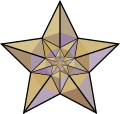Portal:Communism
IntroductionCommunism (from Latin communis 'common, universal') is a sociopolitical, philosophical, and economic ideology within the socialist movement, whose goal is the creation of a communist society, a socioeconomic order centered on common ownership of the means of production, distribution, and exchange that allocates products in society based on need. A communist society entails the absence of private property and social classes, and ultimately money and the state. Communists often seek a voluntary state of self-governance but disagree on the means to this end. This reflects a distinction between a libertarian socialist approach of communization, revolutionary spontaneity, and workers' self-management, and an authoritarian socialist, vanguardist, or party-driven approach to establish a socialist state, which is expected to wither away. Communist parties have been described as radical left or far-left. There are many variants of communism, such as anarchist communism, Marxist schools of thought (including Leninism and its offshoots), and religious communism. These ideologies share the analysis that the current order of society stems from the capitalist economic system and mode of production; they believe that there are two major social classes, that the relationship between them is exploitative, and that it can only be resolved through social revolution. The two classes are the proletariat (working class), who make up most of the population and sell their labor power to survive, and the bourgeoisie (owning class), a minority that derives profit from employing the proletariat through private ownership of the means of production. According to this, a communist revolution would put the working class in power, and establish common ownership of property, the primary element in the transformation of society towards a socialist mode of production. Communism in its modern form grew out of the socialist movement in 19th-century Europe that argued capitalism caused the misery of urban factory workers. In 1848, Karl Marx and Friedrich Engels offered a new definition of communism in The Communist Manifesto. In the 20th century, Communist governments espousing Marxism–Leninism came to power, first in the Soviet Union with the 1917 Russian Revolution, then in Eastern Europe, Asia, and other regions after World War II. By the 1920s, communism had become one of the two dominant types of socialism in the world, the other being social democracy. For most of the 20th century, a third of the world's population lived under Communist governments. These were characterized by one-party rule, rejection of private property and capitalism, state control of economic activity and mass media, restrictions on freedom of religion, and suppression of opposition. With the dissolution of the Soviet Union in 1991, many governments abolished Communist rule. Only a few nominally Communist governments remain, such as China, Cuba, Laos, North Korea, and Vietnam. Except North Korea, these have allowed more economic competition while maintaining one-party rule. Communism's decline has been attributed to economic inefficiency and to authoritarianism and bureaucracy within Communist governments. While the emergence of the Soviet Union as the first nominally Communist state led to communism's association with the Soviet economic model, several scholars argue that in practice this model functioned as a form of state capitalism. Public memory of 20th-century Communist states has been described as a battleground between anti anti-communism and anti-communism. Authors have written about mass killings under communist regimes and mortality rates, which remain controversial, polarized, and debated topics in academia, historiography, and politics when discussing communism and the legacy of Communist states.[page needed][page needed] (Full article...) Selected article
The Workers' Party (Arabic: حزب العمال), formerly the Tunisian Workers' Communist Party (Arabic: حزب العمال الشيوعي التونسي, Ḥizb al-‘Ummāl ash-Shuyū‘ī at-Tūnisī; French: Parti communiste des ouvriers de Tunisie, PCOT), is a Marxist-Leninist political party in Tunisia. Its general secretary is Hamma Hammami. After their involvement in the uprising against Zine el-Abidine Ben Ali, PCOT held their first conference as a legal party on July 22–24, with up to 2000 persons attending.
In the 2011 Constituent Assembly election, the candidates of PCOT's electoral formation ran by the name "Revolutionary Alternative" (Arabic: البديل الثوري al-badīl ath-thawrī; French: Alternative révolutionaire) and won 3 of the 217 seats, in Sfax, Kairouan and Siliana. In July 2012, the PCOT decided to remove the word "communist" from its name to avoid the stereotype associated with this term. Selected biographyJohann Zénon Bernard (13 February 1893 in Kahler – 25 June 1942 in Kassel, Germany) was a Luxembourgian communist politician. He led the Communist Party of Luxembourg during its first two decades of existence, and was the first communist elected to the parliament of Luxembourg. He died in German captivity during the Second World War. Bernard was a metal worker by profession. He joined the socialist movement when the First World War broke out. He became a leading figure in the leftwing faction of the Socialist Party, advocating affiliation to the Communist International. In January 1921, he took part in the founding of the Communist Party of Luxembourg and became the secretary of the Central Committee of the party. In May 1921, he became the party chairman. Bernard was elected to parliament in the 1934 national election. He was the first Luxembourgian communist elected to parliament. He was, however, barred from occupying his seat by the centre-right majority, on the pretext that as a revolutionary Bernard could not swear on the Constitution. Did you know...
Selected imageNews related to communismNo recent news Related portalsRelated WikiprojectsRelated featured content Participate!Everyone is welcome to participate in WikiProject Socialism, where editors collaborate to improve all aspects related to socialism on Wikipedia. Selected quote
SubcategoriesWant to find an article related to communism? Try browsing through any of the main categories below:
Select [►] to view subcategories
Communism-related topics
GeneralVariations of CommunismOrganizations and ruling parties, past and present
Personalities
Present and former Socialist states (under the direction of Communist parties)
Ideology and tactics
StructureMarxian economics topicsHistorical events
Military topics
Artists and writers
Influential works
Anti-communism
Communism-related listsThings you can do
Communism in non-English WikipediasArticles:
Associated WikimediaThe following Wikimedia Foundation sister projects provide more on this subject:
Discover Wikipedia using portals |

























